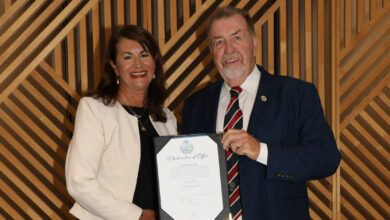The number of people testing positive to influenza has nose-dived in the past two months, in a rare seasonal trend linked to COVID-19 restrictions.
In West Moreton there have been fewer than five reported influenza cases a week since early April (including four weeks with zero cases, including the most recent week). Before the sudden drop, there had been a gradual upward trend in numbers each week during 2020 – up to a peak of 41 cases in one week in mid-March.
The number of local flu cases mirrors an Australia-wide trend that has seen national influenza notified cases drop from 6974 and 7167 in January and February, to 5891 in March before dropping sharply to just 307 and 226 in April and May respectively. Comparative notified cases in Queensland were 1542 and 1971 in January and February, 2152 in March, before dropping to 90 and 56 in April and May respectively.
West Moreton Health’s Public Health Physician Dr Catherine Quagliotto said the dramatic drop in reported cases was unusual compared with past years.
She said the turning point in March might be attributed to Australia’s international travel ban and reduced interstate and state-wide travel, alongside a range of COVID-19 measures that were also effective in reducing influenza transmissions. There were also some changes earlier this year to the amount of testing for flu, as the focus was on COVID-19, but the drop in flu cases makes sense given the measures that have been put in place to reduce the spread of COVID-19.
“Before the introduction of tougher restrictions, the national influenza numbers were similar to the high numbers recorded in January and February last year, which was a bad year for influenza,” Dr Quagliotto said.
“COVID-19 restrictions limiting incoming international travel very likely helped stop the transmission of other infectious diseases, like influenza.
“Similarly, physical distancing, good hand hygiene and staying home when sick are measures that are just as effective at reducing influenza transmission as COVID-19. Hopefully these messages stay with people into the future as important measures to limit the spread of infectious illnesses.”
She said there was one other important weapon in the fight against flu – vaccination.
“The flu shot remains the best defence against influenza and we have been pleased to see good uptake of the flu vaccine so far this year.’’
Despite the encouraging numbers, Dr Quagliotto has warned the community not to become complacent, adding the traditional flu season had not yet begun.
“We generally expect to see the number of cases start to spike from July through to September or early October, so as restrictions are lifted and people are moving about and interacting more, there is greater opportunity for spread of the usual winter infections, including flu.”
Dr Quagliotto said it was not too late for people to get their flu shot.
“Influenza is a serious illness, particularly for at-risk groups including the elderly, people with chronic conditions and children under five, and a flu shot will also reduce the chance of suffering COVID-19 and influenza at the same time,” she said.

Ipswich City Council provides a free community immunisation clinic to eligible residents.
Click here to find out where Ipswich City Council’s community immunisation clinics are being held.
Click here to check if you are eligible.
All other Queenslanders can purchase the vaccine from their doctor or immunisation provider.


